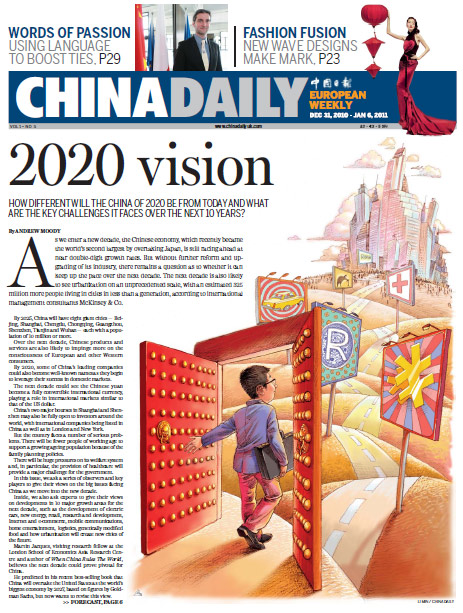Opportunities only 'a question of time'
Updated: 2010-12-17 10:21
By Zhu Ning (China Daily European Weekly)
Relaxed policies that enable entry of more foreign players needed
European banks, particularly some of the biggest names that have tapped into the market for quite a long time, have already seen rapid progress in the Chinese market. However, their pace of expansion has been overshadowed by their local counterparts, which have greatly benefited from the booming domestic economy.
Generally speaking, the average growth rate in China's banking sector has been so high that foreign banks have found it difficult to catch up.
The regulatory authorities, which enforce relatively stringent policies while issuing licenses for foreign financial institutions have, to some extent, deterred European lenders' business development in China.
Policy relaxations that enable the entry of more foreign players in China's financial market are now needed.
In China, the big four State-owned lenders account for a lion's share of the domestic market. With more regional, cooperative and commercial banks coming up, market share has seen some change. But the domestic lenders still have tremendous advantages in terms of branch network and customer knowledge over their foreign peers.
To offset their weakness in the operating network, overseas lenders are putting more emphasis on providing private banking and wealth management services to high-end customers to leverage their strength in providing more flexible and innovative financial products. Compared with developing corporate customers, it is easier for foreign banks to establish relationships with premier customers in the country.
Foreign banks' relatively slow expansion pace in China should also be attributed to their unclear business positioning. As financial conglomerates in their home countries, many large European banks have operating businesses ranging from investment banking to commercial banking. Such strategies somewhat strain their resources and distract management, which in turn, hamper their growth momentum. Moreover, foreign banks, when compared with their Chinese counterparts, fall short of local talent, especially at the management level. A team that is headed by expatriate managers dispatched from the banks' global headquarters in Europe, which is quite frequently the case, can hardly compete with local lenders as they lack in local knowledge.
The reputation of foreign lenders has also been tarnished after overseas customers incurred losses through investments in high-risk investment products. This will make Chinese customers more wary while choosing foreign banks as their asset managers. Such negative effects are likely to continue for some time in the Chinese market.
Of course, it is not all that bad for foreign banks in China. Banks like HSBC and Deutsche Bank have formed long-term strategic partnerships with domestic lenders to ride the growth wave in China.
Such cooperation can also be extended to business partnerships in certain specific projects outside China, to help Chinese banks' rapid expansion pace overseas and the government's intention to use its currency globally. Meanwhile, foreign banks could also benefit from Chinese firms' aggressive ambition to invest in merger and acquisition activities.
Going forward, the current banking regulations imposed on foreign banks may be gradually relaxed, so that they can compete with domestic lenders on an equal footing. At the same time, their expertise in management and overseas expansion will boost their performance in China.
Moreover, a market-oriented interest rate reform in Chinese market is essential. If such reforms are successful, Chinese banks, which at present rely heavily on interest rate spread to make profits, will see reduced profit margins.
The opening up of the financial markets will offer more opportunities for foreign lenders. Opportunities will also come up in the relatively untapped rural financial markets for foreign banks. It is only a question of time.
The author is deputy director and professor of finance at the Shanghai Advanced Institute of Finance, Shanghai Jiao Tong University.
Paper's Digest

Convertible yuan
The yuan is likely to be fully convertible and on the way to being one of the world's major currencies by 2020.
Fight against inflation
Words of passion
Euro vision
Specials

Internet aids luxury sales
More sophisticated Chinese consumers are surfing for luxury products on the Internet and a number of branded labels are ready to ride the wave.

Tobacco controls
An anti-smoking watchdog has criticized Chinese authorities for "making little progress" on enforcing tobacco controls.

Godfather of yachts
Traugott Kaminski claims he was the first person to bring the yacht culture to China seven years ago.
